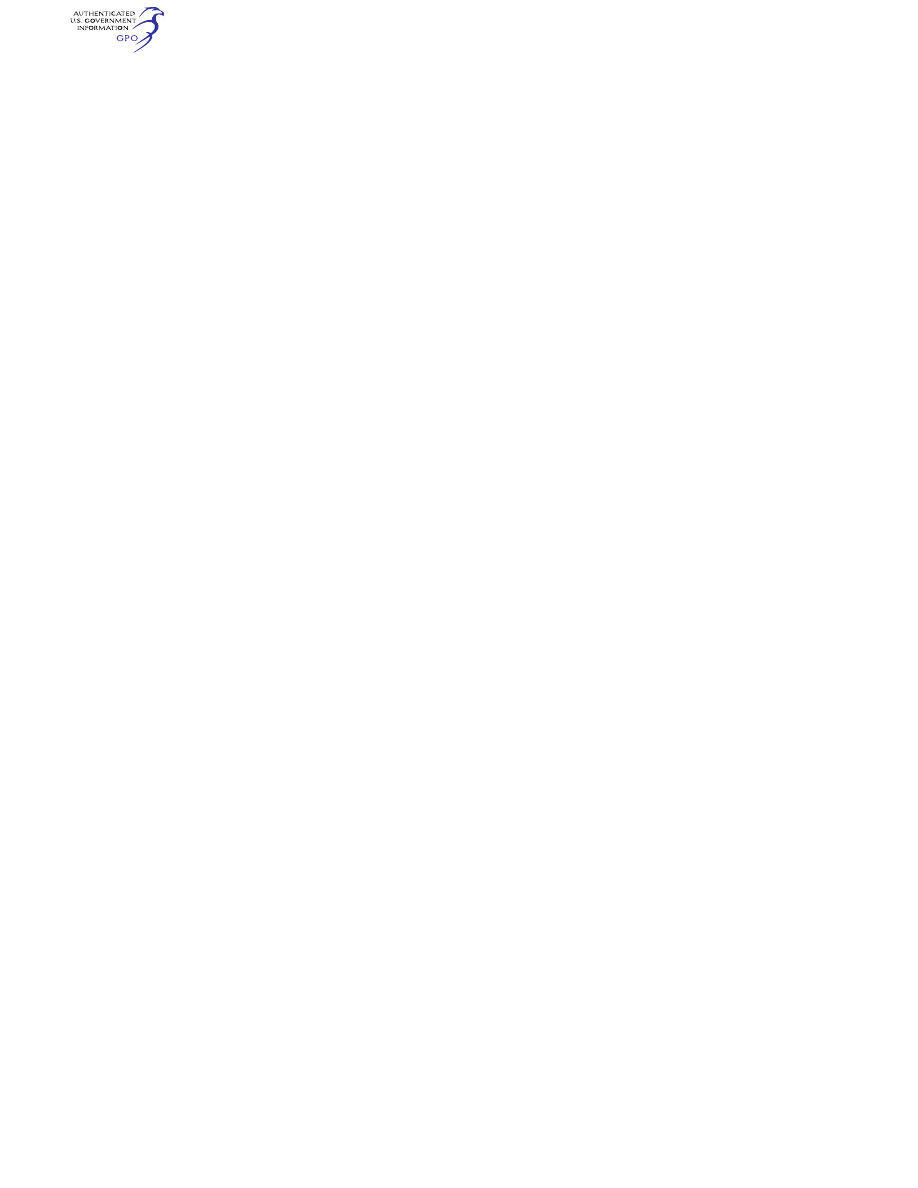
351
Federal Aviation Administration, DOT
§ 25.1383
(b) Burns. The temperature of any
part that may be handled by a crew-
member during normal operations
must not cause dangerous inadvertent
movement by the crewmember or in-
jury to the crewmember.
[Amdt. 25–123, 72 FR 63406, Nov. 8, 2007]
§ 25.1362
Electrical supplies for emer-
gency conditions.
A suitable electrical supply must be
provided to those services required for
emergency procedures after an emer-
gency landing or ditching. The circuits
for these services must be designed,
protected, and installed so that the
risk of the services being rendered inef-
fective under these emergency condi-
tions is minimized.
[Amdt. 25–123, 72 FR 63406, Nov. 8, 2007]
§ 25.1363
Electrical system tests.
(a) When laboratory tests of the elec-
trical system are conducted—
(1) The tests must be performed on a
mock-up using the same generating
equipment used in the airplane;
(2) The equipment must simulate the
electrical characteristics of the dis-
tribution wiring and connected loads to
the extent necessary for valid test re-
sults; and
(3) Laboratory generator drives must
simulate the actual prime movers on
the airplane with respect to their reac-
tion to generator loading, including
loading due to faults.
(b) For each flight condition that
cannot be simulated adequately in the
laboratory or by ground tests on the
airplane, flight tests must be made.
§ 25.1365
Electrical appliances, motors,
and transformers.
(a) Domestic appliances must be de-
signed and installed so that in the
event of failures of the electrical sup-
ply or control system, the require-
ments of § 25.1309(b), (c), and (d) will be
satisfied. Domestic appliances are
items such as cooktops, ovens, coffee
makers, water heaters, refrigerators,
and toilet flush systems that are
placed on the airplane to provide serv-
ice amenities to passengers.
(b) Galleys and cooking appliances
must be installed in a way that mini-
mizes risk of overheat or fire.
(c) Domestic appliances, particularly
those in galley areas, must be installed
or protected so as to prevent damage or
contamination of other equipment or
systems from fluids or vapors which
may be present during normal oper-
ation or as a result of spillage, if such
damage or contamination could create
a hazardous condition.
(d) Unless compliance with § 25.1309(b)
is provided by the circuit protective
device required by § 25.1357(a), electric
motors and transformers, including
those installed in domestic systems,
must have a suitable thermal protec-
tion device to prevent overheating
under normal operation and failure
conditions, if overheating could create
a smoke or fire hazard.
[Amdt. 25–123, 72 FR 63406, Nov. 8, 2007]
L
IGHTS
§ 25.1381
Instrument lights.
(a) The instrument lights must—
(1) Provide sufficient illumination to
make each instrument, switch and
other device necessary for safe oper-
ation easily readable unless sufficient
illumination is available from another
source; and
(2) Be installed so that—
(i) Their direct rays are shielded from
the pilot’s eyes; and
(ii) No objectionable reflections are
visible to the pilot.
(b) Unless undimmed instrument
lights are satisfactory under each ex-
pected flight condition, there must be a
means to control the intensity of illu-
mination.
[Doc. No. 5066, 29 FR 18291, Dec. 24, 1964, as
amended by Amdt. 25–72, 55 FR 29785, July 20,
1990]
§ 25.1383
Landing lights.
(a) Each landing light must be ap-
proved, and must be installed so that—
(1) No objectionable glare is visible
to the pilot;
(2) The pilot is not adversely affected
by halation; and
(3) It provides enough light for night
landing.
(b) Except when one switch is used
for the lights of a multiple light instal-
lation at one location, there must be a
separate switch for each light.
VerDate Sep<11>2014
09:06 Jun 28, 2024
Jkt 262046
PO 00000
Frm 00361
Fmt 8010
Sfmt 8010
Y:\SGML\262046.XXX
262046
jspears on DSK121TN23PROD with CFR

352
14 CFR Ch. I (1–1–24 Edition)
§ 25.1385
(c) There must be a means to indicate
to the pilots when the landing lights
are extended.
§ 25.1385
Position light system installa-
tion.
(a)
General. Each part of each posi-
tion light system must meet the appli-
cable requirements of this section and
each system as a whole must meet the
requirements of §§ 25.1387 through
25.1397.
(b)
Forward position lights. Forward
position lights must consist of a red
and a green light spaced laterally as
far apart as practicable and installed
forward on the airplane so that, with
the airplane in the normal flying posi-
tion, the red light is on the left side
and the green light is on the right side.
Each light must be approved.
(c)
Rear position light. The rear posi-
tion light must be a white light mount-
ed as far aft as practicable on the tail
or on each wing tip, and must be ap-
proved.
(d)
Light covers and color filters. Each
light cover or color filter must be at
least flame resistant and may not
change color or shape or lose any ap-
preciable light transmission during
normal use.
[Doc. No. 5066, 29 FR 18291, Dec. 24, 1964, as
amended by Amdt. 25–38, 41 FR 55468, Dec. 20,
1976]
§ 25.1387
Position light system dihe-
dral angles.
(a) Except as provided in paragraph
(e) of this section, each forward and
rear position light must, as installed,
show unbroken light within the dihe-
dral angles described in this section.
(b) Dihedral angle
L (left) is formed
by two intersecting vertical planes, the
first parallel to the longitudinal axis of
the airplane, and the other at 110 de-
grees to the left of the first, as viewed
when looking forward along the longi-
tudinal axis.
(c) Dihedral angle
R (right) is formed
by two intersecting vertical planes, the
first parallel to the longitudinal axis of
the airplane, and the other at 110 de-
grees to the right of the first, as viewed
when looking forward along the longi-
tudinal axis.
(d) Dihedral angle
A (aft) is formed
by two intersecting vertical planes
making angles of 70 degrees to the
right and to the left, respectively, to a
vertical plane passing through the lon-
gitudinal axis, as viewed when looking
aft along the longitudinal axis.
(e) If the rear position light, when
mounted as far aft as practicable in ac-
cordance with § 25.1385(c), cannot show
unbroken light within dihedral angle
A
(as defined in paragraph (d) of this sec-
tion), a solid angle or angles of ob-
structed visibility totaling not more
than 0.04 steradians is allowable within
that dihedral angle, if such solid angle
is within a cone whose apex is at the
rear position light and whose elements
make an angle of 30
°
with a vertical
line passing through the rear position
light.
[Doc. No. 5066, 29 FR 18291, Dec. 24, 1964, as
amended by Amdt. 25–30, 36 FR 21278, Nov. 5,
1971]
§ 25.1389
Position light distribution
and intensities.
(a)
General. The intensities prescribed
in this section must be provided by new
equipment with light covers and color
filters in place. Intensities must be de-
termined with the light source oper-
ating at a steady value equal to the av-
erage luminous output of the source at
the normal operating voltage of the
airplane. The light distribution and in-
tensity of each position light must
meet the requirements of paragraph (b)
of this section.
(b)
Forward and rear position lights.
The light distribution and intensities
of forward and rear position lights
must be expressed in terms of min-
imum intensities in the horizontal
plane, minimum intensities in any
vertical plane, and maximum inten-
sities in overlapping beams, within di-
hedral angles
L, R, and A, and must
meet the following requirements:
(1)
Intensities in the horizontal plane.
Each intensity in the horizontal plane
(the plane containing the longitudinal
axis of the airplane and perpendicular
to the plane of symmetry of the air-
plane) must equal or exceed the values
in § 25.1391.
(2)
Intensities in any vertical plane.
Each intensity in any vertical plane
(the plane perpendicular to the hori-
zontal plane) must equal or exceed the
appropriate value in § 25.1393, where
I is
VerDate Sep<11>2014
09:06 Jun 28, 2024
Jkt 262046
PO 00000
Frm 00362
Fmt 8010
Sfmt 8010
Y:\SGML\262046.XXX
262046
jspears on DSK121TN23PROD with CFR

